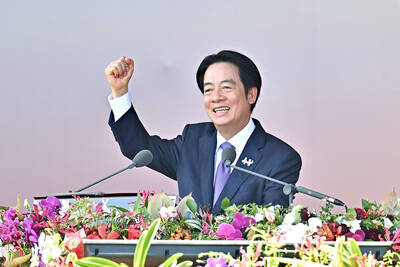To some longtime Russian associates, Victor Bout is a charismatic, legitimate businessman who can sniff out a deal and clinch it as few others can.
To British Foreign Office minister Peter Hain, Bout is a "leading merchant of death" in Africa.

PHOTO: NY TIMES
Bout, 34, is among the busiest of the world's shadowy small-arms traders, according to two UN reports that detail sanctions violations in Angola and Sierra Leone. Further details of his business come from criminal investigations in several countries and from interviews with arms dealers, their business associates and employees -- many of whom spoke on condition of anonymity for fear of job safety or arrest.
A score of weapons merchants from the former Soviet Union have built reputations as the main go-to men in an illicit market for arms sales estimated at US$8 billion annually by the Center for Analysis of Strategies and Technologies, a Moscow-based think tank.
While these traffickers share similar Soviet backgrounds, they are not all Russian nationals. They do not work together as a Mafia, and are known to mistrust each other, according to three arms traders interviewed.
But their deals usually have this in common: Guns obtained from former Soviet stockpiles or under false pretenses from arms manufacturers are smuggled past authorities and shipped to the buyer's home nation, often passing through a third country en route.
Born in Dushanbe, Tajikistan, Bout -- also known as "Victor Boutov" -- graduated from Moscow's prestigious Military Institute of Foreign Languages. He served in the Soviet air force, and worked as a military translator for a contingent of UN peacekeepers sent to Angola in 1987, according to the Ukrainian secret service.
After completing his contract there, he started a legitimate business, capitalizing on the ties he had forged with Angolan military and political leaders, a Russian associate said. Within a few years after the Soviet Union's demise, this diminutive linguist ran one of the largest air cargo operations in west and central Africa.
In 1996, he created his flagship company Air Cess. The firm contracted with various east African militaries to move troops and supplies in his durable, Soviet-made planes to war zones where no roads exist, but airstrips do.
In a country where white skin is rare, it became commonplace to see dozens of Ukrainian and Moldovan pilots, flight mechanics and technicians around Kigali, the Rwandan capital. Bout's operation was so well known that locals nicknamed the villa in the Kimihurura section of Kigali where his employees lived "the Kremlin."
Risk taker
Bout's reputation as a risk-taker and handler of difficult cargo ensured a booming business. By 1997, his planes were ferrying troops, arms and other supplies to Congolese rebels backed by the Rwandan government, according to officials from each country.
While Bout's business operations in Rwanda were legal, some activities in other parts of the world caught the attention of law enforcement officials. In December 1996, Bout opened the head office for Air Cess in Ostende, Belgium. Seven months later, after Belgian authorities began a money-laundering investigation into his activities, Bout abandoned the office, and relocated to Sharjah, United Arab Emirates.
In Africa, civil aviation officials became curious about Bout's airplanes, which number about 30, and the web of companies that he operates.
Some planes held registration numbers in Swaziland, although the corporate headquarters were in Sharjah. It was unusual since common practice in the air-transport business is to register planes in the same country. Other planes from the same company held registration numbers from Liberia and Equatorial Guinea, while still others appeared to switch registration while in the air. A UN report concludes that using these methods Bout was able to smuggle arms to areas under sanctions.
Throughout 1997 and 1998, Air Cess was busy flying arms to Angola's UNITA rebels and Sierra Leone's fierce Revolutionary United Front (RUF) in violation of international sanctions, according to two UN reports published in December by the Security Council committees overseeing sanctions regimes in those two countries.
In response to the two UN reports last December, many European diplomats publicly expressed outrage during UN meetings that Bout was working so brazenly in these war zones.
Amid this international uproar, the Russian moved his offices out of Sharjah. By March, his company headquarters reappeared, just a couple of kilometers away, in Adjman,a neighboring emirate.
Bout, who still lives in Sharjah, denied over the course of several months repeated requests for an interview to discuss his business and allegations of arms dealing, saying through an interlocutor he did not feel the need to justify his life to journalists. An Air Cess official said that the company does not engage in illegal activities, but he declined to answer further questions.
Fake certificates
However, evidence in the UN reports and confirmed through other sources indicates that Bout has proved masterful at obtaining faked end-user certificates -- a key tool of the trade.
In the world of legal arms sales, most deals are signed between two governments and sealed with an end-user certificate, a document usually certified by the buyer country's defense minister or secretary of state. The document verifies that the weapons will remain in the buyer country and not be resold or transferred. Authorities say these certificates help keep weapons out of undesirable hands.
Fortunately for black-market arms dealers, however, end-user certificates are not standardized and there is no central regulating body overseeing the process. These certificates are easily bought from corrupt officials, or forged.
International sanctions were imposed against UNITA rebels in 1993 in hopes of ending the decades-long civil war in Angola. Circumventing these sanctions, Bout brokered at least 38 arms shipments from Bulgarian arms companies to the rebels between 1997 and 1998 -- aided with fake end-user certificates obtained from officials in the African country of Togo, the Security Council reports say.
According to cargo manifests revealed to UN investigators, Air Cess planes flew Kalashnikovs, rocket-propelled grenades, anti-tank mines, shells and other ammunition from Burgas, Bulgaria. The total value of these shipments was estimated by Russian arms analysts at over US$20 million. Nowhere do the documents list the cargo's destination. When questioned by UN investigators, Bulgarian authorities said they had no reason to believe the weapons were going anywhere other than Togo.
Juan Larrain, Chile's ambassador to the UN and head of the international body's committee monitoring the Angola sanctions, calls Bout skillful but dangerous.
"The destruction that arms dealers like him perpetuate is awful," Larrain said. "They don't care about the killing or the human suffering. They just care about the money."
By all accounts, Bout enjoys the good life. Intelligence sources say his income is considerable.
"In exchange for the shipments to UNITA, Bout received uncut diamonds worth at least US$10 million," says the Ukrainian security service's dossier on Bout.
Bout has used a complex web of commercial organizations to mask his illegal business, said Larrain. "He's made himself a man of the world, different pseudonyms and passports. He has to discover that he is not above the law," Larrain said.
Despite the allegations against Bout contained in the UN reports, little has been done to curb his business operations.
While the Security Council's investigation was underway, Air Cess has profited from the UN. The company's planes ferried UN peacekeepers from Pakistan to East Timor, a contract that air cargo officials say could be worth up to US$100,000.
Bout is currently exploring new, apparently legitimate, business opportunities in the Democratic Republic of Congo, his employees said. Bout has been a frequent visitor to Beni, a remote rebel-held town in eastern Congo.
He has spent weeks at the Hotel Beni while meeting with rebel leader Jean-Pierre Bemba, who controls the northeastern section of the Democratic Republic of Congo. In May, he sold a Czech-made L-410 passenger plane to Bemba, the employees said.
"The man gets around," said a pilot who works for Bout. "He's got serious business to attend to."

The Ministry of the Interior (MOI) is to tighten rules for candidates running for public office, requiring them to declare that they do not hold a Chinese household registration or passport, and that they possess no other foreign citizenship. The requirement was set out in a draft amendment to the Enforcement Rules of the Public Officials Election and Recall Act (公職人員選舉罷免法 ) released by the ministry on Thursday. Under the proposal, candidates would need to make the declaration when submitting their registration forms, which would be published in the official election bulletin. The move follows the removal of several elected officials who were

FOUR DESIGNATED AREAS: Notices were issued for live-fire exercises in waters south and northwest of Penghu, northeast of Keelung and west of Kaohsiung, they said The military is planning three major annual exercises across the army, navy and air force this month, with the navy’s “Hai Chiang” (海強, “Sea Strong”) drills running from today through Thursday, the Ministry of National Defense said yesterday. The Hai Chiang exercise, which is to take place in waters surrounding Taiwan, would feature P-3C Orion maritime patrol aircraft and S-70C anti-submarine helicopters, the ministry said, adding that the drills aim to bolster the nation’s offshore defensive capabilities. China has intensified military and psychological pressure against Taiwan, repeatedly sending warplanes and vessels into areas near the nation’s air defense identification zone and across

SENATE RECOMMENDATION: The National Defense Authorization Act encourages the US secretary of defense to invite Taiwan’s navy to participate in the exercises in Hawaii The US Senate on Thursday last week passed the National Defense Authorization Act (NDAA) for Fiscal Year 2026, which strongly encourages the US secretary of defense to invite Taiwan’s naval forces to participate in the Rim of the Pacific (RIMPAC) exercise, as well as allocating military aid of US$1 billion for Taiwan. The bill, which authorizes appropriations for the military activities of the US Department of Defense, military construction and other purposes, passed with 77 votes in support and 20 against. While the NDAA authorizes about US$925 billion of defense spending, the Central News Agency yesterday reported that an aide of US

NATIONAL DAY: The ‘Taiwan Dome’ would form the centerpiece of new efforts to bolster air defense and be modeled after Israel’s ‘Iron Dome,’ sources said President William Lai (賴清德) yesterday pledged to strengthen the nation’s air defense capabilities and build a “T-Dome” system to create a safety net against growing military threats from China. “We will accelerate our building of the T-Dome, establish a rigorous air defense system in Taiwan with multi-layered defense, high-level detection and effective interception, and weave a safety net for Taiwan to protect the lives and property of citizens,” he said in his National Day address. In his keynote address marking the Republic of China’s (ROC) 114th anniversary, Lai said the lessons of World War II have taught nations worldwide “to ensure that